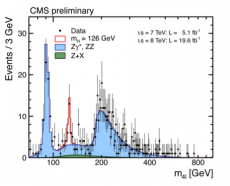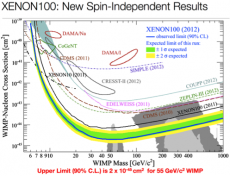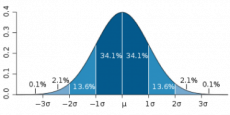Statistical Methods in Particle Physics
Introduction

"Statistics is the grammar of science." - Karl Pearson
For those of you who are keen to extend their education in the field of particle physics, it may be interesting to attend this course. The lecture and especially the hands-on exercises are particularly relevant for those who always wanted to know how to exactly interpret the discovery plot for the Higgs boson or the exclusion limits for New Physics at the LHC, and who are interested to learn more about data analysis techniques in general.
Supporting material
The following text books can be advised as a good starting point for graduate level students:
- Cowan: Statistical Data Analysis (Oxford Science Publications)
- Barlow: Statistics: A Guide to the Use of Statistical Methods in the Physical Sciences (Manchester Physics Series)
- Lyons: Statistics for Nuclear and Particle Physicists (Cambridge University Press)
- P.R.Bevington and D.K.Robinson "Data reduction and error analysis for the physical sciences", WBC/McGrow-Hill, 1992
- Blobel, Lohrmann: Statistische Methoden der Datenanlyse (Teubner, in German) Ebook: http://www.desy.de/~blobel/eBuch.pdf
Formalia
Lectures (Link to LSF) every Monday 14:15 - 16:00, starting October 12th at INF 227 (KIP) / SR 3.404
Tutorials every Monday 16:00 - 18:00, starting October 12th at CIP Pool, KIP / 1.401
Please sign up at the electronic tutorial administration.
We will hand out an exercise sheet every week, the solutions for which have to be handed in per electronic email by Saturday 23h00 of the same week. The results will be discussed in the tutorial session on Monday of the following week (i.e. only one week later!), to ensure you get timely feedback.
The written exam will take place on Friday February 5th 14h00 - 16h00 in INF 308 HS 1.
The results of the exams can be reviewed (Klausureinsicht) on Tuesday 16 February 13h00-14h00 in INF 227 (KIP) / SR 3.404, i.e. the usual lecture room this term.
Prerequisite knowledge
On the statistics side, there is no prerequisite knowledge, and we will (briefly) repeat the basic principles of statistics. On the particle physics side, the PEP5 lecture is sufficient. However, it appears to us that our lecture would be a natural follow-up on the Particle Physics lecture.
Lectures
| 12.10.2015 | Lecture 1 | Overview + goals of the lecture course; Introduction to basic statistical tools | |
| 19.10.2015 | Lecture 2 | Formal introduction to probability, Conditional probabilities, Bayes' theorem, Frequentist and Bayesian interpretation | |
| 26.10.2015 | Lecture 3 | Probability density (PD) functions, fundamental PDs, useful-to-know PDs. | |
| 2.11.2015 | Lecture 4 | Central limit theorem (CLT), statistical and systematic uncertainties, propagation of uncertainties, combination of uncorrelated measurements | |
| 9.11.2015 | Lecture 5 | The Monte Carlo (MC) method, MC integration, MC simulation, generation of random numbers in [0,1] or distributed according to a PD | |
| 16.11.2015 | Lecture 6 | Applications of MC simulation in HEP: event generation and detector simulation; Estimators and their properties | |
| 23.11.2015 | Lecture 7 | Simple estimators for the mean and variance. The maximum likelihood (ML) method as an estimator, variance of ML estimators with the analytical and graphical methods | |
| 30.11.2015 | Lecture 8 | Variance of ML estimators with the MC method, combining measurements with ML, extended ML method, ML with binned data | |
| 7.12.2015 | Lecture 9 | Connection between ML and Bayesian statistics, connection between ML and least squares methods. Hypothesis testing: goodness-of-fit test with Pearson's χ² and Kolmogorov-Smirnov | |
| 14.12.2015 | Lecture 10 | Terminology of hypothesis testing, example using particle ID, Neyman-Pearson lemma, contructing a test statistic, significance of an observed signal using a Posson RV example | |
| 21.12.2015 | Lecture 11 | Confidence intervals and limits: Neyman construction, limits near a physical boundary, Feldman and Cousins limit construction, expected and observed limits | |
| 4.1.2016 | NO lecture |
Two papers on the CLs method to read instead: A.L. Read, "Modified frequentist analysis of search results (the CLs method)" CERN open-2000-205 (+ optional follow-up "Presentation of search results: the CLs technique", J. Phys. G: Nucl. Part. Phys. 28 2693 (2002)); G. Aad (ATLAS Collaboration), "Observation of a new particle in the search for the Standard Model Higgs boson with the ATLAS detector at the LHC", Phys. Lett. B, 716 1 (2012). You can download the papers through the University's network, to use the journal subscription. |
|
| 11.1.2016 | Lecture 12 | Multivariate analysis (MVA) techniques and their application in particle physics: linear Fisher discriminant, neural networks | |
| 18.1.2016 | Lecture 13 | Unfolding techniques: bin-by-bin unfolding, regularised unfolding, iterative unfolding | |
| 25.1.2016 | Lecture 14 | Decision trees and boosted decison trees as MVA techniques, brief summary of the CLs method |
Übungsblätter
- 01
- 02
- 03
- 04
- 05
- 06
- 07
- 08
- 09
- 10
- 11
- 12
Übungsgruppen
- Gruppe Tutorial (Dr. Veit Scharf)
14 Teilnehmer/innen
INF 227 / CIP Pool KIP 1.401, Mo 16:00 - 18:00



